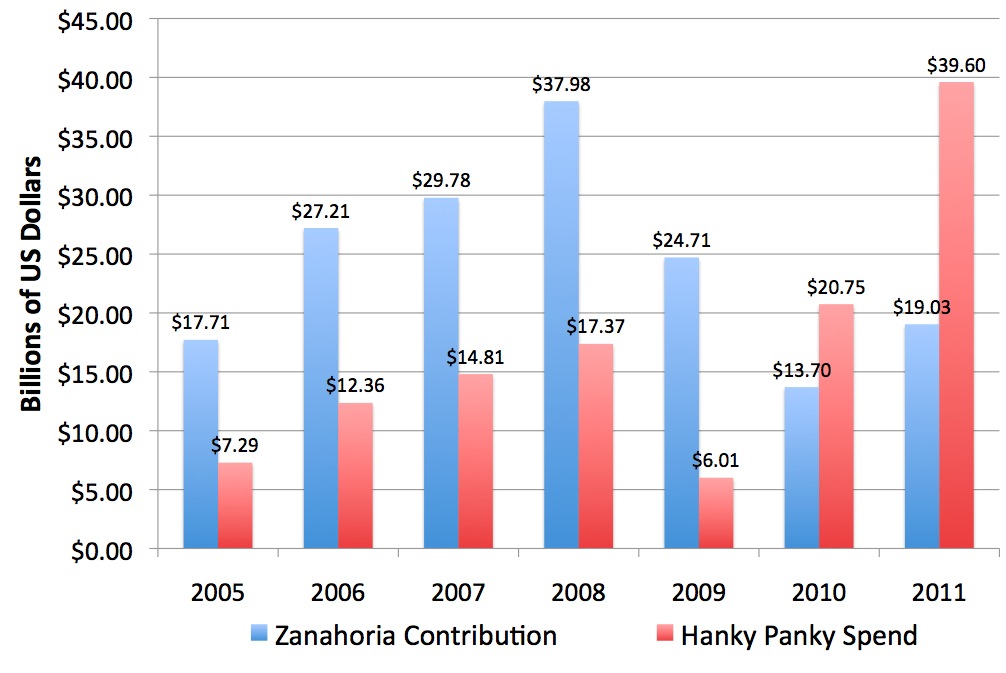 |
"Social Expenditure" of the Chavez regime funded by PDVSA:
in blue, funds that have gone through Venezuela's Treasury;
in red, as per Hugo Chavez's orders, funds spent directly by
|
London 2.5.12 | A recent post by
Francisco Toro at Caracas Chronicles brought back from memory a conversation I had not long ago: “But you can’t deny that Chavez is an extremely popular politician, can you?” quipped the former UK Ambassador to Venezuela to me in a meeting. “Of course he’s popular, you give me the opportunity to spend the kind of money Chavez spends, without oversight, and I too can become Venezuela’s most popular politician, even a mentally retarded bloke would become popular with that kind of money!” I replied.
Using
PDVSA's own numbers, Francisco has calculated how much money has Chavez spent the regular way, read monies transferred from PDVSA to Venezuela's Treasury via taxes, royalties and dividends (Zanahoria Contribution in the graph), versus how much money has the dictator spent at his sole and absolute discretion, read funds PDVSA spends directly upon receiving orders from Chavez. It is worth citing
Francisco:
You’ll search high and low in Venezuela’s 1999 constitution for PDVSA’s right to spend money this way. In the polite fictions of Bolivarian constitutional doctrine, Venezuela operates under the principle of a “Unified Treasury” – all funds paid to the state are meant to go into a single pot. Once there, elected representatives in the National Assembly have to give explicit permission, through a budget law, before the government is allowed to spend any of it.
That obviously can’t happen if PDVSA skips the whole parliamentary rigamarole and starts spending money on whatever the president orders that day. Which, more and more, is what actually happens.
But it gets worse: more and more "social spending" is being done the Chavez way, that is bypassing any constitutionally mandated oversight mechanism, so much so that, according to Francisco's calculation
based on PDVSA own numbers, "for every petrodollar spent under legislative oversight" in Venezuela $2.08 are spent outside approved budget, as per Chavez's direct and absolute discretionary orders.
Better to borrow again from Francisco:
As recently as 2009, just 24 petrocents were spent without legislative approval for every petrodollar spent under legislative oversight. Last year, that proportion had jumped to 2.08 to 1.
Which is why I can say, with scientific precision, that today we are 8.7 times more Petrocaudillistic than we were three years ago.
And it gets worse still: since 2001, Hugo Chavez has been able to spend, freely without any oversight or accountability, $123.1 billion. No, it is not a mistake. Add the numbers of the graph on the left, and,
voilá, $123.1 billion. In addition to regular spending in the form of official freebies, known as
misiones, which are basically vote buying, political-loyalty programs devised by Chavez to keep his 'popularity levels' very high. All this money considered, the size of the failure of the Chavez administration is, sadly, just too big: whether it's
housing,
inflation -the highest in Latin America,
poverty,
employment, or
crime levels, his 'revolution' has only
fiascos to show for.
Therefore I challenge any of the many analysts who have an opinion on Chavez's 'popularity' to provide an example (just one) of another politician in Venezuela's contemporary history, or anywhere else for that matter, with the spending power that the Venezuelan dictator has enjoyed in the last decade. I hear Gaddafi and Libya, the Saudi autocrats, Putin... all truly 'popular'
petrodictators democratic leaders. And this is why Venezuela's opposition simply can't mount a half coherent platform against Chavez: the bloody thug just has too much money at his disposal, and has been able to co-opt just about everybody, and in politics, whether it's Venezuela or the US, money talks and bullshit walks.
Fortunately, this disgrace of a caudillo will die soon enough in the care of communist medicine, and then... Then things are only going to get even worse, hopefully for just a while, though how long is anyone's guess.








